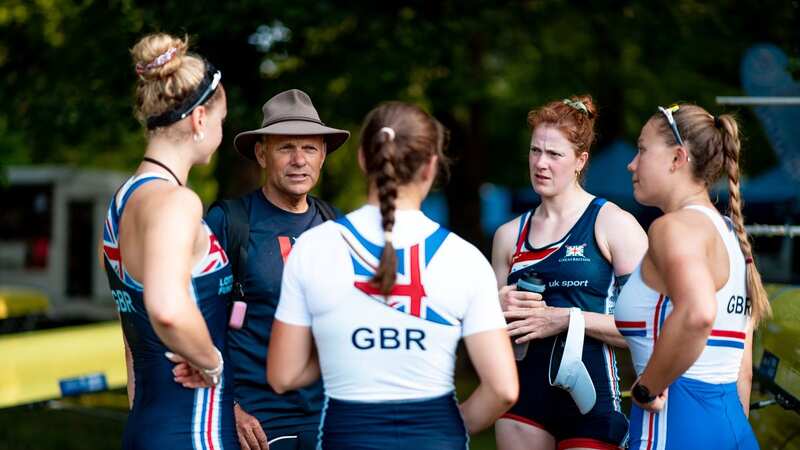
If British sport wants something done, it asks an Australian and that maxim is working better for Team GB’s rowers than most.
For every Eddie Jones or Matthew Mott, there is an Ange Postecoglou and now Andrew Randell, the acerbic Canberra native at the helm of GB’s women’s squad. Having inherited a programme at a crossroads after the Tokyo Olympics, Randell has scripted a remarkable turnaround to place several crews in pole position for Paris podiums.
It is all done with an easy, homespun charm, the perfect combination of carrot and stick to turn underachievers into world-beaters.
“I don’t think I needed to change much, just hard work and getting right what I call the NTRs - no talent required,” says Randell. “First day, we got a few fundamentals right. The morale wasn’t particularly good and people were slagging each other off so that all needed to stop - which it did, very quickly.
“We tried to change the small things, rather than each crew unloading their own boat from the trailer and running off, we start at the top and we all do it.
 World's oldest Olympian, who competed at London Games in 1948, dies aged 107
World's oldest Olympian, who competed at London Games in 1948, dies aged 107
“There was a desire for change and a desire for success, so I didn’t have to push hard at all, we moved very quickly.”
Aussie Paul Thompson was the mastermind behind the success of the women’s squads at London 2012 and now Randell, a senior coach at Rowing Australia from 1995, has been given the keys to the castle. He has rewired the East German training philosophy of legendary former lead coach Jurgen Grobler, who espoused hard work on land and light paddling on water.
Randell ‘keeps things quiet’ on the rowing machine and focuses on a ‘high specificity of training in relation to racing’, with training sessions operating at 80% boat speed. This represents a challenge to the Grobler orthodoxy but a simple shift in Randell’s mind.
“I don’t think I needed to change much,” he says. “The coaching structure was already here, the pipeline of athletes was fine and the facility was fine.
“So if the coaches are good and the athletes are good, there’s no reason you shouldn’t do well. But they just weren’t, so then it comes down to working hard. From what I saw when I came in, they probably didn’t do enough work.”
The results are there for all to see. The lightweight women’s double of Imogen Grant and Emily Craig are unbeaten since finishing fourth by the barest of margins in Tokyo; double world and European champions, and named World Rowing’s female crew of the year.
The women’s quad won their first global gold in 13 years in September and the turnaround has been encapsulated by the women’s eight, a ‘project boat’ in Tokyo, now with a European silver and World Cup gold under their belts heading into Olympic year. Hannah Scott, a member of the world-beating quad, says: “The one thing this programme for the women shows is respect for each other.
“If you can get a seat in a crew boat now, there are definitely no passengers. All of us have earned our seats and are bringing something unique to that boat.
“There definitely weren't any passengers before but every seat has had blood, water, everything thrown at it to get there. Before it was jumping through hoops, but now everyone has sacrificed something.”
Randell is a passionate believer into the importance of psychology and isn’t afraid of throwing in a curveball or two.
 Eddie Hearn opens talks for Anthony Joshua vs Francis Ngannou heavyweight fight
Eddie Hearn opens talks for Anthony Joshua vs Francis Ngannou heavyweight fight
“Every morning, I’ll call one girl out and ask her what she’s grateful for,” he says. “That starts the day with oneness, we run through a few exercises which give that sense of wholeness and belonging. We want to thrive rather than survive.”
Four of Team GB’s female crews finished fourth in Tokyo as the wider squad struggled, with Australia second in the sport’s medal table with women’s crews to the fore. With returning Olympic medallists Helen Glover and Karen Bennett back in the fold and Randell at the wheel, hopes are soaring for a strong performance next summer in Paris.
“I have a formula that’s been successful anywhere at any level,” said Randell. “If it isn't broke don’t fix it. If someone can show me another method of being successful then I’m always curious and open-minded, but until we’re not top of the medal table, we’ll go down a path that I know gets you there.”
British Rowing is the governing body for the sport and is responsible for the development of rowing in England and the training and selection of rowers to represent Great Britain. The GB Rowing Team is supported by the National Lottery Sports Fund. To find out more, and to follow the team, head to https://britishrowing.org/